Live on the homepage now!
Reader Supported News
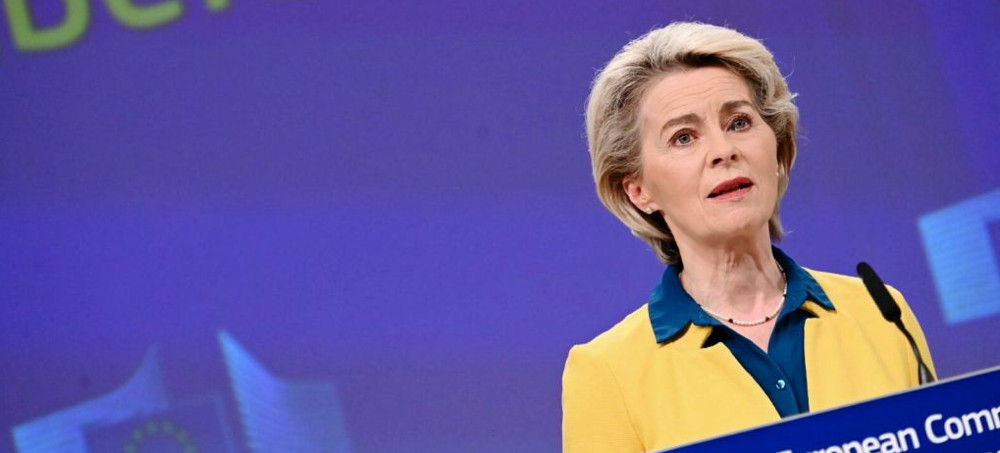 European Commission President Ursula von der Leyen. (photo: Yves Herman/Reuters)
European Commission President Ursula von der Leyen. (photo: Yves Herman/Reuters)
In an opinion published Friday, the E.U. executive arm said Ukraine and fellow aspirant Moldova should be granted candidate status with conditions that they improve their judiciaries and other elements of their governments.
“Ukraine has clearly demonstrated the country’s aspiration and commitment to live up to European values and standards,” European Commission President Ursula von der Leyen said at a news conference, wearing a yellow jacket and blue blouse in clear reference to the Ukrainian flag. Despite the war, “we have applied the commission’s rigorous standards in assessing these membership applications,” she added.
The recommendation, which comes a day after the leaders of Germany, France and Italy expressed support, does not confer candidate status — the first step on the path to membership — but bolsters the cause of the Eastern European countries heading into a European Council summit on the issue next week. For the cases to move forward, all 27 member states must agree. And even then, full membership for Ukraine and Moldova could be many years away.
But backing from the commission highlights a new sense of urgency over the need for Europe to support Ukraine as it is hammered by Russian forces in its east, as well as a growing desire to send a message to Russian President Vladimir Putin about Europe’s future.
“Ukrainians are ready to die for the European perspective,” von der Leyen tweeted. “We want them to live with us the European dream.”
I commend the positive @EU_Commission Conclusion on 🇺🇦’s candidate status. It’s the 1st step on the EU membership path that’ll certainly bring our Victory closer. Grateful to @vonderleyen & each EC member for a historic decision. I expect the positive result from #EUCO next week.
— Володимир Зеленський (@ZelenskyyUa) June 17, 2022
Ukrainian President Volodymyr Zelensky welcomed the “historic decision” and said the “positive” first step on his country’s E.U. membership path would bring Ukraine’s “victory closer.” Ukrainian Foreign Minister Dmytro Kuleba also hailed the decision, calling it “vivid proof of European leadership and a huge boost for Ukraine’s further transformations.” Both said they expected an endorsement at next week’s summit.
But the commission’s recommendation falls short of what Ukraine has lobbied for. Ukrainian officials have insisted that their country deserves fast-track candidate status without conditions. “We are not playing the game of promises,” Olha Stefanishyna, a deputy prime minister, said during a visit to Brussels last week.
Von der Leyen said Friday that Ukraine had been “gradually moving closer to the union” for eight years and had implemented about 70 percent of E.U. rules and norms. “Ukraine is a robust parliamentary democracy,” she added, with a “sound” economy.
But the commission listed six steps it wants to see Ukraine take. Among them: implementing laws to ensure the selection of qualified judges and to limit the influence of oligarchs. It also asked that Ukraine improve its track record on investigations, prosecutions and convictions for corruption.
Some of that would present a challenge as long as the war continues.
“The accession process remains based on established criteria and conditions," the commission said in a memo. “This allows any country in the process to progress based on own merits but also means that steps towards the EU can be reversed if the underlying conditions are not met anymore.”
Fellow Eastern European nation Georgia will have to wait, with greater conditions placed on it, von der Leyen told reporters.
In Moscow, spokesman Dmitry Peskov said Friday that the Kremlin would be monitoring Ukraine’s E.U. candidacy prospects.
“This would certainly require our close attention, because we all know how discussions on the defense aspects of the E.U.’s security have intensified in Europe,” he said, according to Russia’s Tass new agency.
Since Russia launched its invasion in February, Zelensky has pleaded with E.U. officials and member countries for Ukraine to be fast-tracked in.
E.U. officials and some leaders have voiced support during visits to Kyiv, saying that Ukraine is a member of the “European family” and that its future lies with the bloc. But their enthusiasm for the cause — and interest in posing for pictures with Zelensky — has often seemed at odds with where E.U. countries actually stand on the question of accession.
Through months of war, E.U. leaders have tried to temper Ukrainian expectations, stressing that membership could be decades away. In private conversations, many E.U. diplomats have expressed concerns about the country’s readiness.
But in recent weeks, as the war has entered a new and brutal phase, the momentum has shifted.
Ukrainian leaders and diplomats have toured European capitals to make the case for candidacy. Von der Leyen made another trip to Kyiv. Then came words of support from the leaders of Europe’s three largest economies.
In a visit with Zelensky on Thursday, French President Emmanuel Macron, German Chancellor Olaf Scholz and Italian Prime Minister Mario Draghi cast this as a historic moment for Ukraine and for the E.U.
Draghi said Europe was at a turning point in its history. “Every day,” he said, “the Ukrainian people are defending the values of democracy and liberty that are the pillars of the European project, of our project.”
Scholz said he had come with the message that Ukraine “belongs to the European family.” Macron offered reassurance: “Ukraine can count on us.”
In Brussels, E.U. diplomats increasingly see support for Ukraine and other countries bordering Russia as a signal to Putin. Putin has asserted that Ukraine is not a real country and is seeking to bring it — and others — forcibly into the Russian sphere of influence. However, E.U. membership for Ukraine and Moldova defies Putin’s ambitions.
The question is whether all E.U. members states are, in fact, willing to back Ukraine’s E.U. ambitions.
There has long been strong support for Ukraine’s candidacy among the Baltic states and other Eastern European countries. The Netherlands, Denmark and Portugal are among those that remain skeptical — although no country has firmly declared a closed door to Ukraine.
Opposition to Ukrainian candidacy tends to focus on readiness — particularly given that the country is still at war — and the fact that other countries are ahead in line. A prospective member’s entire body of laws must be brought into compliance with standards set by Brussels. Several would-be members have been in limbo for years now.
Heading into next week’s summit, debate is likely to center on the conditions for the countries seeking candidate status, as well as on the question of how to revive stalled accessions talks elsewhere.
Although much debate is expected, some E.U. officials appear hopeful. The E.U. ambassador to Ukraine tweeted Friday that as he waited for the commission’s recommendation, he could not “help recalling a similarly beautiful summer day 25 years ago when the Commission opened my native Estonia’s E.U. path.”
Back then, there was “the same positive anxiety,” Matti Maasikas wrote. There was also “the same feeling of history in the air.”
 Some of the records relating to the Robb Elementary School shooting could be "highly embarrassing," involve "emotional/mental distress," and are "not of legitimate concern to the public," the lawyers argued. (photo: Allison Dinner/Getty)
Some of the records relating to the Robb Elementary School shooting could be "highly embarrassing," involve "emotional/mental distress," and are "not of legitimate concern to the public," the lawyers argued. (photo: Allison Dinner/Getty)
Some of the records relating to the Robb Elementary School shooting could be “highly embarrassing,” involve “emotional/mental distress,” and are “not of legitimate concern to the public,” the lawyers argued.
“The City has not voluntarily released any information to a member of the public,” the city’s lawyer, Cynthia Trevino, who works for the private law firm Denton Navarro Rocha Bernal … Zech, wrote in a letter to Texas Attorney General Ken Paxton. The city wrote the letter asking Paxton for a determination about what information it is required to release to the public, which is standard practice in Texas. Paxton's office will eventually rule which of the city's arguments have merit and will determine which, if any, public records it is required to release.
The letter makes clear, however, that the city and its police department want to be exempted from releasing a wide variety of records in part because it is being sued, in part because some of the records could include “highly embarrassing information,” in part because some of the information is “not of legitimate concern to the public,” in part because the information could reveal “methods, techniques, and strategies for preventing and predicting crime,” in part because some of the information may cause or may "regard … emotional/mental distress," and in part because its response to the shooting is being investigated by the Texas Rangers, the FBI, and the Uvalde County District Attorney.
The letter explains that Uvalde has at least one in-house attorney (whose communications it is trying to prevent from public release), and yet, it is using outside private counsel to deal with a matter of extreme importance and public interest. Uvalde’s city government and its police department did not immediately respond to a request for comment from Motherboard.
The city says that it has received 148 separate public records requests (including several from Motherboard), and has lumped all of them together, making a broad legal argument as to why it should not be required to respond to many of them. Earlier this week, Motherboard reported on a similar letter sent to Paxton by the Texas Department of Public Safety, which wanted to suppress body-camera footage because it could expose “weaknesses” in police response to crimes that criminals could exploit. (The main seeming weakness in the Uvalde response was that police, in violation of standard policy and protocol, refused to risk their lives to protect children.)
For example, the city and its police department argue that it should be exempted from releasing “police officer training guides, policy and procedure manuals, shift change schedules, security details, and blueprints of secured facilities,” because these could be used to decipher “methods, techniques, and strategies for preventing and predicting crime.” The Uvalde Police Department and Texas Department of Public Safety have been pilloried by the press and the public for standing in the hallway while a gunman killed children—against standard protocol—and for preventing parents from entering the building to save their children. The letter also argues that the department should be exempted from releasing body camera footage simply because it could be “information considered to be confidential by law, either constitutional, statutory, or by judicial decision.”
It is impossible to say what records, in particular, the city and the police are referring to in many parts of the letter. For example, it says it cannot release an individual's criminal history because it would be "not of legitimate concern to the public," because it could be "highly embarrassing," and because it would violate their common-law right to privacy. But the letter does not talk about who the records would be about, why they wouldn't be relevant to the public, or why they would be highly embarrassing.
“They claim that the compilation of individuals’ criminal history is highly embarrassing information, which is a strange cover. The embarrassing information is the inept police response,” Christopher Schneider, a professor of sociology at Brandon University who studies police body cameras and the disclosure of footage from them, told Motherboard, noting that suspects' criminal histories are released by the police all the time without anyone having requested them. “They have no problem using information like that against individuals of the public. The information disclosure needs to go both ways, if that’s the case.” Disciplinary or criminal records for members of the police, for example, would be obviously relevant public information in a case in which the police response has been highly criticized. "It’s rather ripe to say any of this is not of legitimate public concern," he added. "The whole country is trying to figure out how to not allow this to happen again."
This is a relatively common sort of argument, but it shows yet again that the deck is stacked against the public disclosure of public records when they are inconvenient or embarrassing to the police.
“The case that’s being made contains some particularly asinine stonewalling,” Schneider said. “It seems like the city is throwing everything at the wall to see what sticks, and seeking a ruling to suppress this information from being released.”
Schneider says that lumping together all 148 public records requests, and asking for a legal ruling on everything at once, seems like a tactic to prevent the release of anything and everything.
“It appears that they’re conflating all of the information requests as a justification to not release the stuff we should be seeing. If it’s an officer’s email to his wife, yeah, we don’t need to see this. But the body-worn camera footage is of concern. They’re conflating all of this information together to suppress the legitimate stuff,” he said.
In his research, Schneider said that body-worn cameras often do not do what they’re supposed to do, which is hold police accountable to the public. This is because public records laws are often written in such a way as to provide wide latitude to police to decide what the public actually gets to see, and allows them to “regain control of the narrative” when it is convenient for them.
“It’s not a coincidence journalists run into this problem [of not being able to obtain body camera footage] over and over again,” Schneider said. “The law is by design, the privacy rules are by design to make it absolutely as difficult as possible to release the information.”
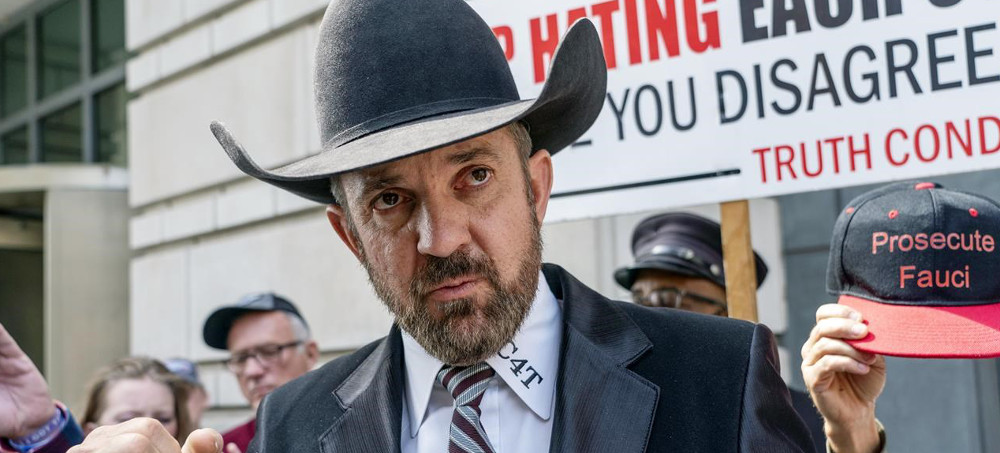 Otero county commission's refusal to certify votes over unfounded doubts blatantly flouts state election law. (photo: Getty)
Otero county commission's refusal to certify votes over unfounded doubts blatantly flouts state election law. (photo: Getty)
Otero county commission’s refusal to certify votes over unfounded doubts blatantly flouts state election law
There’s an incredibly important standoff playing out in New Mexico right now that is setting off loud alarm bells about the potential for overturning a future American election.
The clash is taking place in Otero county, which sits along the New Mexico-Texas border and is home to about 70,000 people. Donald Trump overwhelmingly carried the county with nearly 62% of the vote in 2020. On Monday, the three-member county commission refused to certify the results of the state’s 7 June primary.
In their meeting, the commissioners, all Republicans, didn’t cite specific reasons for taking the extraordinary step of not certifying the contest. Two of the commissioners referenced generalized concerns about voting machines from Dominion, a company that has been the target of numerous conspiracy theories about the election. The third commissioner pointed to ineligible voters casting ballots, but didn’t cite a specific number of votes he was concerned about (You can watch the entire meeting here.)
For months, baseless claims about fraud have been percolating in Otero county, which voted overwhelmingly for Donald Trump in 2020. The county commissioned a review of the 2020 election by inexperienced people who wound up making inaccurate claims about the county’s voting machines. The county commission has since voted to get rid of all Dominion voting machines and count all ballots by hand, which experts warn is less reliable than a machine count. New Mexico law already requires a post-election audit, which the state completed in 2020.
“I don’t trust Dominion, period,” Vickie Marquardt, one of the county commissioners said during Monday’s meeting.
“I don’t have specific examples that I can point to other than the recent audit and the canvass and the uncertainty of what that produced,” said Couy Griffin, another commissioner. Griffin is the founder of Cowboys for Trump, who was convicted of a misdemeanor for entering the US Capitol complex on January 6 (his sentencing is set for Friday).
Marquardt, Griffin and Gerald Matherly, the third county commissioner, did not respond to interview requests.
It’s a “canary in the coalmine” for what could be coming in November and in 2024, Maggie Toulouse Oliver, New Mexico’s secretary of state, told me. She said she’d never seen anything like this before.
“What we’re seeing in Otero county is a complete breakdown of the rule of law and the democratic process,” Oliver, a Democrat, said. “This isn’t just about one little county in a state of 2 million population. It’s about what happens as a result of this. What model are they setting for other similar entities around the state and around the country.”
Local officials across the country, citing shaky claims of fraud or lack of confidence in the results, could simply refuse to take the step of certifying elections. People who deny the results of the 2020 election are making a concerted effort to take over these little-known positions, from poll workers to local canvassing boards to secretaries of state.
Oliver’s office filed a lawsuit on Tuesday seeking to force the county commissioners to certify the election. While state law allows for commissioners to seek clarifications about ambiguities or errors, it is clear that they don’t have discretion to refuse to certify an election. On Wednesday, the New Mexico supreme court ordered the county to certify the results no later than 17 June.
Mario Jimenez, a former election official in the state who now works as the campaign director for the New Mexico chapter of Common Cause, a watchdog group, noted New Mexico law makes it a criminal offense to knowingly violate election laws.
“They were instructed by their county attorney on the things they can and cannot do … despite being notified by their own legal expert and this very experienced county clerk, they continue to wilfully break the law and not serve their community or their constituents.”
Oliver’s involvement underscores the kind of power that secretaries of state have to enforce election laws, including in the ballot counting process. Republicans running for secretary of state in many states have openly questioned the 2020 election results, and if they win this fall they could play a key role in blocking results from being certified. Audrey Trujillo, a Republican running against Oliver in New Mexico this year, has called the 2020 election a “coup” and urged commissioners across the state not to certify county results absent a hand recount and “forensic audit”.
During Monday’s meeting, the commission’s attorney advised commissioners that they could be forced by court order to certify the election if they refused. The commissioners were unfazed. “And so then what? They’re going to send us to the pokey?” Marquardt said.
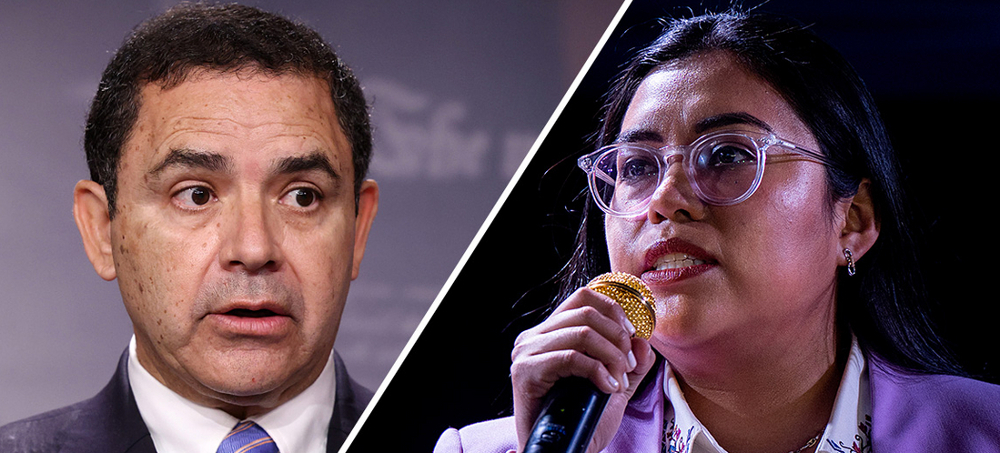 A recount has begun between Texas Democratic Rep. Henry Cuellar and his challenger, Jessica Cisneros. (photo: Getty)
A recount has begun between Texas Democratic Rep. Henry Cuellar and his challenger, Jessica Cisneros. (photo: Getty)
Before the recount, Cuellar had been leading Cisneros by 187 votes, or 0.4 percentage points, out of 45,429 ballots counted as of last week, according to an Associated Press count. The AP will not declare a winner until the recount is completed.
It was not clear Thursday when the recount would be finished.
The recount was requested by Cisneros, a 29-year-old immigration attorney who is trying to unseat the nine-term South Texas congressman for the second time in as many years. She lost by 4 percentage points in 2020 behind national support from the party’s progressive leaders, including Sens. Bernie Sanders of Vermont and Elizabeth Warren of Massachusetts.
Cuellar has said his lead will hold in Texas' 28th Congressional District, which is heavily Hispanic and runs to the southern border with Mexico. He has bucked his party for years over issues including abortion and gun rights but has kept the support of Democratic leaders in Congress, including House Speaker Nancy Pelosi.
The winner of will face Cassy Garcia, who won the Republican runoff for the seat in May.
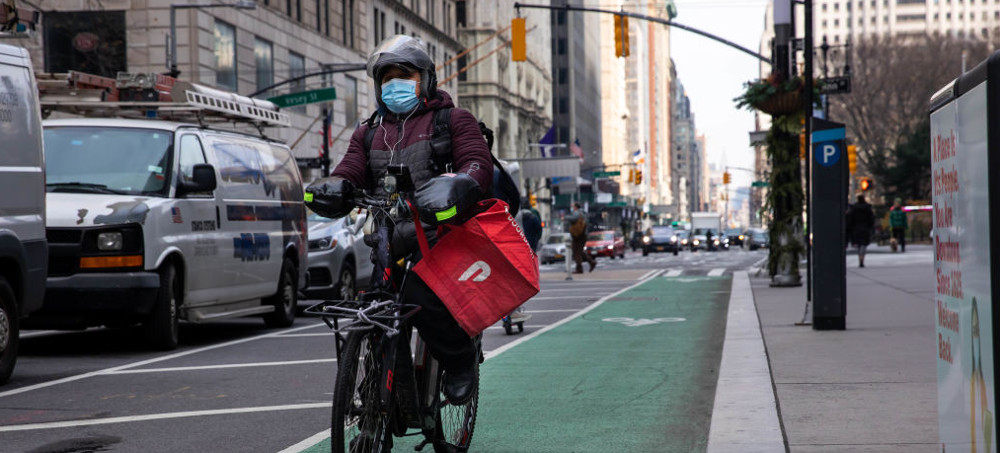 A bike messenger carries a DoorDash bag during a delivery in New York, U.S. (photo:Michael Nagle/Getty)
A bike messenger carries a DoorDash bag during a delivery in New York, U.S. (photo:Michael Nagle/Getty)
A new survey finds that US gig workers face much greater economic hardship and insecurity than conventional low-wage retail and food-service workers. Lacking most labor law protections, many make less than minimum wage and can’t afford to pay basic bills.
A report on the survey was published by the Economic Policy Institute (EPI), with the survey itself conducted by the Shift Project, which is a joint project at Harvard Kennedy School and the University of California, San Francisco. In the spring of 2020, the Shift Project elicited responses via Facebook and Instagram advertisements, targeting gig workers at the likes of DoorDash, Instacart, Lyft, and Uber, as well as W-2 employees at fifty-eight large retail and food-service companies including Arby’s, Chick-fil-A, Home Depot, Kroger/QFC, McDonald’s, Publix, Starbucks, Target, Walgreens, and Walmart. The surveys included questions about demographics, job characteristics, and economic security issues, with respondents comprising 288 gig workers and 4,201 service-sector workers.
While so-called gig companies tout the advantages of flexible labor arrangements that classify their workforce as independent contractors rather than employees, the survey shows that this workforce suffered significantly greater economic hardship than their W-2 counterparts in low-wage service-sector work. Deprived of labor standards that come with employee status, such as wage and hour protections, antidiscrimination laws, workers’ compensation, health and safety protections, unemployment benefits, and the right to organize and collectively bargain, many gig workers are unable to make ends meet.
The survey finds that 14 percent of gig workers earned less on an hourly basis than the federal minimum wage — which remains a measly $7.25 an hour — compared to 0 percent of service-worker respondents. Twenty-nine percent of gig workers earned less than the state minimum wage that would be applicable were they a W-2 employee, whereas only 1 percent of the W-2 sample reported earning less than their state’s minimum wage. Twenty-six percent of gig workers earned less than $10 an hour, compared to 11 percent of those in the W-2 sample.
Sixty-two percent of gig workers, or roughly three out of every five, lost earnings because of “technical difficulties clocking in or out,” compared with 19 percent of W-2 service workers. While wage theft is rampant in the low-wage food-service and retail sectors, these workers at least have legal recourse for such violations on the basis of their employee status; not so for gig workers.
The survey also finds that 19 percent of gig workers go hungry because they cannot afford to purchase an adequate amount of food. Thirty percent of gig-worker respondents said they had used SNAP benefits within the month prior to the survey, which was twice the rate of their W-2 counterparts. Thirty-one percent of gig workers reported not paying the full amount of their utility bill in the month prior to the survey.
“While the technology these companies utilize may be innovative, a business model that creates profit by denying workers basic wage and hour protections is far from inventive. Corporations have long looked for ways to exempt themselves from worker protection laws and spend hundreds of millions of dollars each year to deny their workforce union representation,” said Celine McNicholas, general counsel and director of policy and government affairs at EPI, in a statement. “The reality of working for these digital platform companies is far from the great ‘gig’ they advertise. Policymakers must address the reality of gig work and prevent these companies from denying their workers basic protections through misclassifying their workforce.”
The numbers on how much of the US workforce is engaged in gig work remain fuzzy. The Bureau of Labor Statistics (BLS) produced a Contingent Worker Supplement (CWS) to the Current Population Survey to gain some sense of the matter, finding that in 2017, around 10 percent of US workers’ sole or main job consisted of alternative work arrangements such as independent contracting, on-call arrangements, and employment arrangements through temporary agencies or contracted firms. That data does not capture the many workers who engage in gig work as a supplemental source of income, and other studies have found that the number is closer to 16 percent of the US workforce, but even this conservative estimate constitutes a significant proportion of the country’s workforce.
The survey confirms what many gig workers have long insisted: this work arrangement subjects them to greater economic hardship and insecurity as a matter of course. These workers are locked out of existing labor standards and denied coverage under the National Labor Relations Act, and the result is an atrocity. Gig workers’ circumstances are dire, and there is no time to waste in reclassifying them as employees and holding gig companies accountable for the misclassification on which their business models rest.
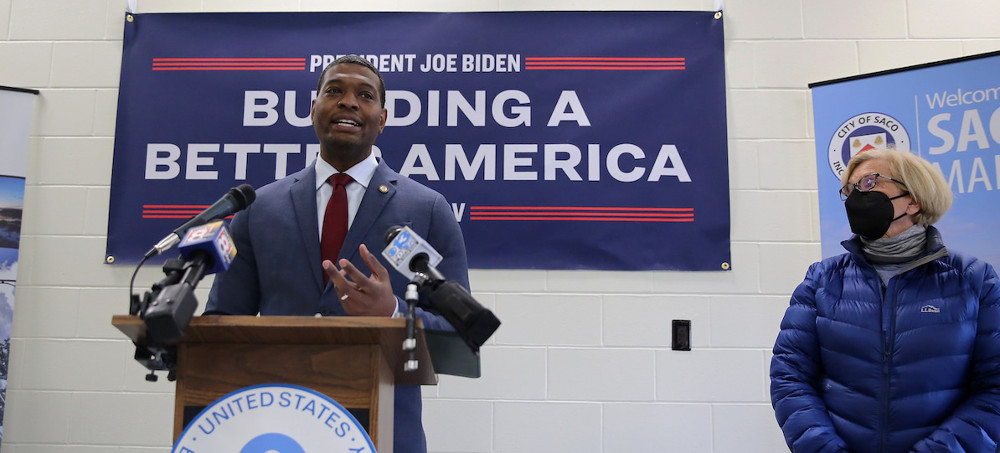 EPA Administrator Michael S. Regan speaks at a press conference at a wastewater treatment facility in Maine in February. (photo: Ben McCanna/Getty)
EPA Administrator Michael S. Regan speaks at a press conference at a wastewater treatment facility in Maine in February. (photo: Ben McCanna/Getty)
Although the compounds, which have been in use since the 1940s, have been voluntarily phased out by U.S. manufacturers, they are still being used and persist in the environment because they degrade very slowly — or not at all — over time. The toxic compounds remain indefinitely in an individual’s bloodstream and can cause serious health conditions like cancer and low birth weight.
“People on the front-lines of PFAS contamination have suffered for far too long,” said EPA Administrator Michael Regan, according to an EPA press release. “That’s why EPA is taking aggressive action as part of a whole-of-government approach to prevent these chemicals from entering the environment and to help protect concerned families from this pervasive challenge.”
The new advisories, part of Regan’s PFAS Strategic Roadmap, set the health risk thresholds for PFOS and PFOA to near zero. These new thresholds replace the 2016 guidelines that had set them at 70 parts per trillion.
An EPA spokesperson said EPA officials are no longer assured that the PFAS levels permitted by the 2016 guidelines will not lead to “adverse health impacts,” The Associated Press reported. The revised health guidelines take lifetime exposure to the chemicals into consideration and are based on recent science.
The agency said it expects to put forward national regulations for the dangerous chemicals in drinking water later this year and anticipates a final rule next year.
The EPA is issuing an invitation to states and territories to apply for $1 billion to address the problem of PFAS and other drinking water contaminants, particularly in disadvantaged or less populated communities, the press release said. The funding, made available through President Biden’s Bipartisan Infrastructure Law, can be used for the testing of water quality, technical assistance, the installation of centralized water treatment and contractor training.
The funding goes along with $3.4 billion in Drinking Water State Revolving Funds and $3.2 billion in Clean Water State Revolving Funds that are also available to address the problem of PFAS water contamination.
Since the new acceptable risk levels are below those that can be measured currently — which stand at about four parts per trillion — a senior administration official said that the EPA recommends action be taken by utilities when the levels of PFAS can be measured, reported The Associated Press.
Several states have set limits for PFAS in drinking water that are much stricter than the federal guidelines.
According to research and advocacy organization the Environmental Working Group, at least 200 million people in the United States are exposed to PFAS-contaminated drinking water.
“EPA had the courage to follow the science. This is a step in the right direction,″ said co-facilitator of the National PFAS Contamination Coalition Stel Bailey, as The Associated Press reported.
The new guidelines only address four out of about 9,000 PFAS compounds, reported The Guardian.
“The EPA should be congratulated on today’s actions, but those kudos should be tempered by the knowledge that these are just four of thousands of these toxic substances,” said Tim Whitehouse, the executive director of Public Employees for Environmental Responsibility, who is a former EPA enforcement attorney, as The Guardian reported. “Health advisories are a long way from enforceable limits and an even much longer way to actual cleanups where these substances are finally removed from our waters, soil and food chain.”
Special Coverage: Ukraine, A Historic Resistance
READ MORE
Follow us on facebook and twitter!
PO Box 2043 / Citrus Heights, CA 95611



No comments:
Post a Comment
Note: Only a member of this blog may post a comment.